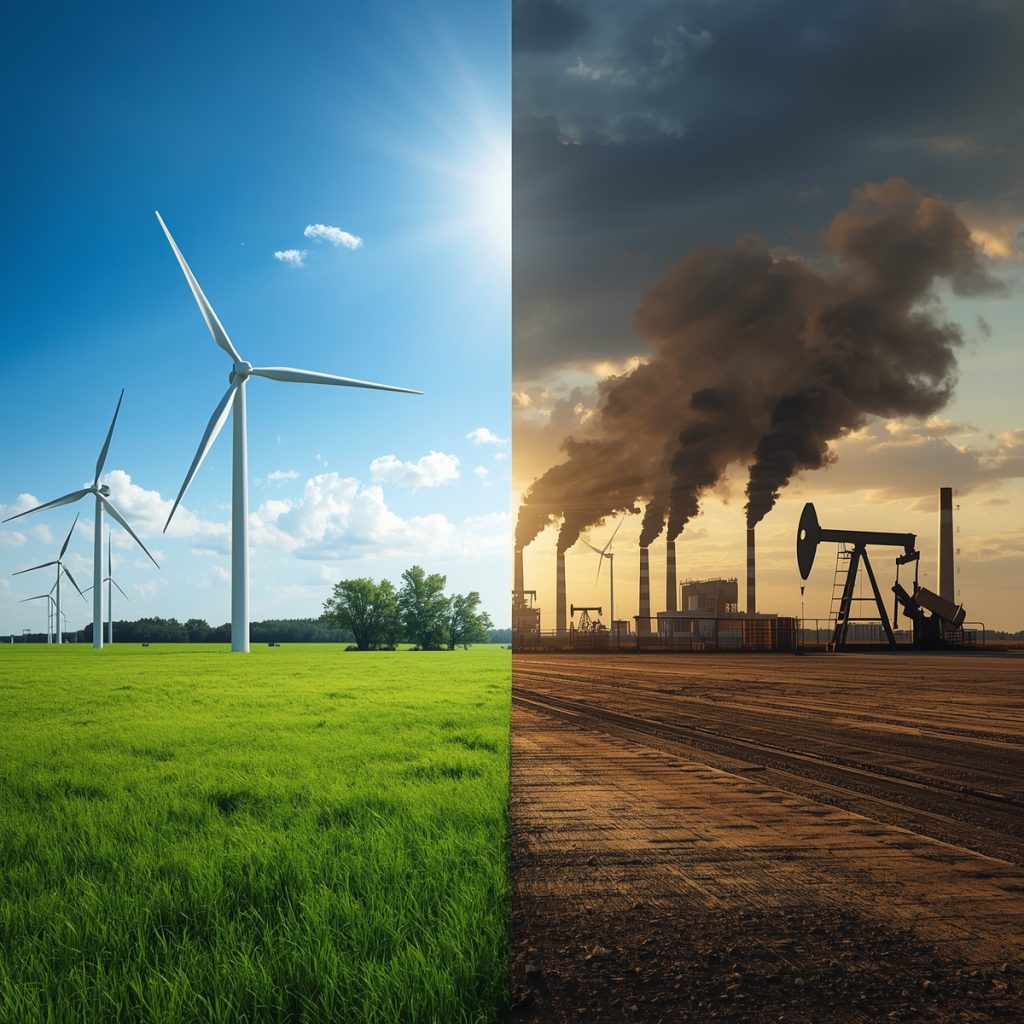Green Energy vs Fossil Fuels 25 | Fossil fuels | greennworld
Green Energy vs Fossil Fuels Green Energy vs Fossil Fuels has become one of the most critical debates of our time. As the global population grows and energy demands rise, the world faces a tough choice between continuing with traditional energy sources and embracing cleaner, renewable alternatives. For decades, fossil fuels like coal, oil, and natural gas have powered industries, vehicles, and homes. But these energy sources come at a steep environmental cost — pollution, greenhouse gas emissions, and global warming. On the other hand, Green Energy vs Fossil Fuels brings to light the potential of renewable energy sources such as solar, wind, hydro, and geothermal power to create a sustainable future for all. This conversation isn’t just about technology — it’s about survival, progress, and our responsibility to the planet. Understanding Green Energy vs Fossil Fuels means exploring how each energy type affects the environment, economy, and human health, and what transitioning to green energy really entails. This article dives deep into their differences, benefits, challenges, and the future of energy worldwide. The Need for a Global Energy Shift To understand the significance of Green Energy vs Fossil Fuels, we must first look at why the world relies so heavily on fossil fuels. Since the Industrial Revolution, coal and oil have been the backbone of modern civilization. They powered factories, transportation, and entire cities, fueling innovation and economic growth. However, the overreliance on fossil fuels has led to catastrophic side effects — air pollution, deforestation, water contamination, and an alarming increase in carbon emissions. Scientists have linked the burning of fossil fuels to climate change, which manifests in rising global temperatures, melting polar ice caps, and more frequent natural disasters. This crisis has prompted nations to rethink their energy choices and explore renewable options that don’t emit harmful pollutants. While fossil fuels are finite and depleting rapidly, renewable sources such as solar, wind, and hydro energy are abundant and continuously replenished by nature. The shift from fossil to renewable energy is not just an environmental necessity but an economic opportunity as well. Transitioning from Green Energy vs Fossil Fuels requires balancing progress with responsibility — a challenge that governments, industries, and individuals must face together. Understanding Green Energy and Fossil Fuels The debate around Green Energy vs Fossil Fuels revolves around how these two sources are produced and their long-term impact. Fossil fuels are formed from the remains of ancient plants and animals buried for millions of years under heat and pressure. Extracting and burning them releases carbon dioxide, sulfur dioxide, and nitrogen oxides — all contributors to global warming and air pollution. Green energy, on the other hand, is generated from natural processes that are constantly replenished. Solar panels convert sunlight into electricity, wind turbines harness air movement, and hydropower uses the flow of water to generate energy. These sources emit little to no greenhouse gases during operation. The biggest distinction between Green Energy vs Fossil Fuels lies in sustainability. Fossil fuels are nonrenewable — once we use them up, they’re gone forever. Green energy, however, offers an infinite supply as long as the sun shines, the wind blows, and rivers flow. Adopting renewable energy also reduces dependence on imported fuels, empowering nations to produce their own energy and strengthening economic independence. This decentralization of energy production helps create jobs, stimulate innovation, and promote local resilience. The real question is not whether we can transition from fossil fuels to green energy — it’s whether we will do it fast enough to avoid irreversible environmental damage. Environmental Impact and Sustainability When comparing Green Energy vs Fossil Fuels, the environmental impact is the most compelling argument in favor of renewables. Burning fossil fuels releases billions of tons of carbon dioxide annually, contributing to the greenhouse effect. These emissions trap heat in the Earth’s atmosphere, leading to rising global temperatures. The result? Extreme weather patterns, droughts, floods, and disrupted ecosystems. Renewable energy sources, however, offer a clean alternative. Solar farms and wind turbines produce electricity without emitting pollutants. Hydroelectric and geothermal power plants, while not entirely impact-free, have significantly lower carbon footprints compared to coal or oil plants. Another critical point in Green Energy vs Fossil Fuels is resource depletion. Oil fields dry up, coal reserves diminish, and natural gas wells decline over time. In contrast, renewable energy relies on endless natural cycles — sunlight, wind, and water. This makes green energy not only sustainable but also future-proof. Beyond environmental benefits, switching to renewables helps preserve biodiversity. Fossil fuel extraction often involves drilling, mining, and deforestation, which destroy habitats and threaten wildlife. In contrast, renewable energy installations can coexist with nature when managed properly. Investing in green energy means investing in the planet’s longevity. Every solar panel or wind turbine installed is a step toward reducing our ecological footprint and building a cleaner, more sustainable world. Economic Comparison The financial side of Green Energy vs Fossil Fuels reveals an evolving landscape. Historically, fossil fuels were cheaper due to established infrastructure and government subsidies. However, in the last decade, renewable energy technologies have advanced rapidly, causing prices to plummet. Today, solar and wind power are among the cheapest energy sources available. The installation of solar panels, wind turbines, and energy storage systems creates millions of new jobs worldwide. In fact, the renewable energy sector is one of the fastest-growing industries on the planet. From engineers to technicians to researchers, it offers opportunities that stimulate local economies and encourage sustainable innovation. On the other hand, fossil fuel industries are becoming increasingly unstable due to fluctuating oil prices and the environmental costs associated with extraction. Regions that rely heavily on coal mining or oil drilling face economic uncertainty as global demand for clean energy rises. In terms of maintenance, renewable systems often have lower operating costs once installed. Wind and solar farms, for instance, require minimal upkeep compared to refineries or coal plants that need continuous fuel input. However, the transition from Green Energy vs Fossil Fuels also requires significant initial investment in

